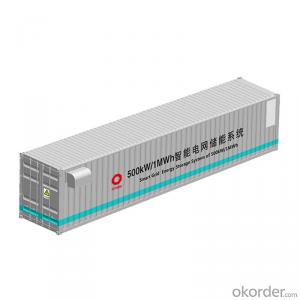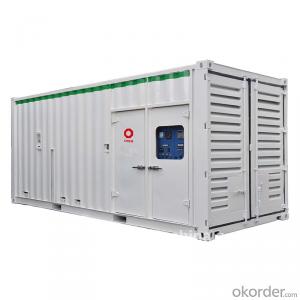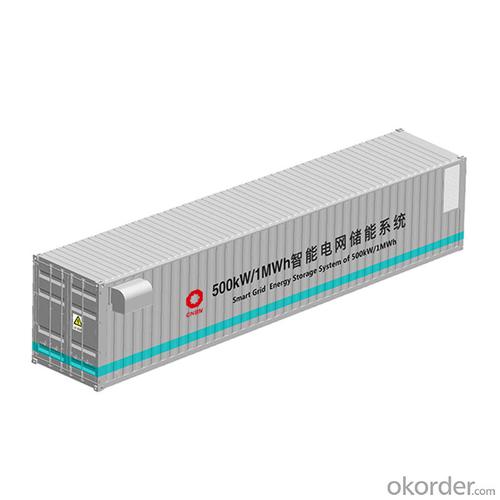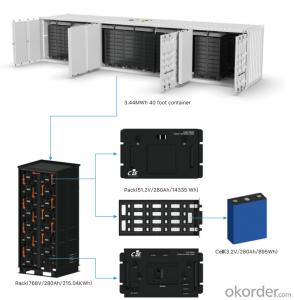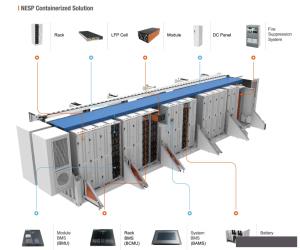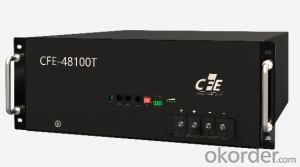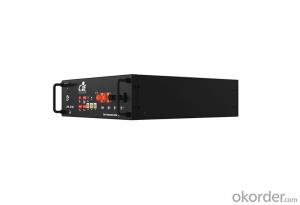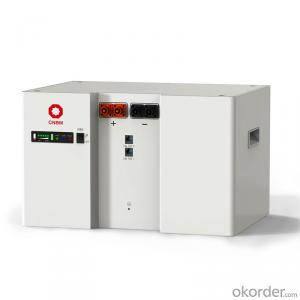Zen Solar Energy Systems - ESS Solar Energy Storage System 500kW 1MWh with LifePO4 Battery Container
- Loading Port:
- Shanghai
- Payment Terms:
- TT OR LC
- Min Order Qty:
- 1 unit
- Supply Capability:
- 10 unit/month
OKorder Service Pledge
OKorder Financial Service
You Might Also Like
Specification
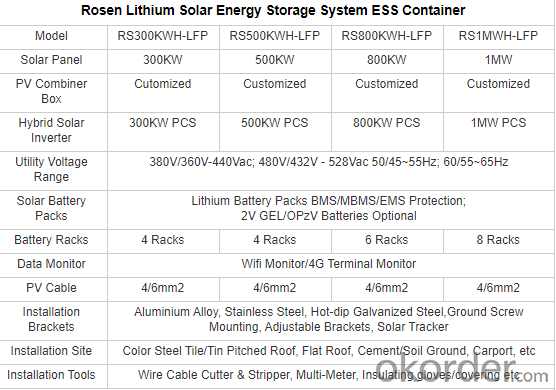
Solar Panels
Mono/Poly/felxible/black etc all types Panels;
High efficiency power up to 450W/ 550W/600W Half Cell/Bifacial Solar PV Modules;
All certificates listed with more than 30years life and warranty
PID Resistant,High salt and ammonia resistance;
Hybrid Energy Storage Inverter
Automatic Switch to charge loads, batteries or from Grid backup with priority setting function; Lithium Battery and GEL storage battery compatible with almost all types of inverters;Comprehensive WIFI monitor for electricity production and consumption data, to check your investment payment on time;
Solar Lithium/GEL Battery Packs
Lithium and GEL Storage Batteries Optional;
100Ah/150Ah/200Ah, with 100kwh/300kwh/500kwh capacity;
BMS Communication matched with almost all types of hybrid energy inverters;
Installation is convenient with cable, rack etc Accessories ready in package.
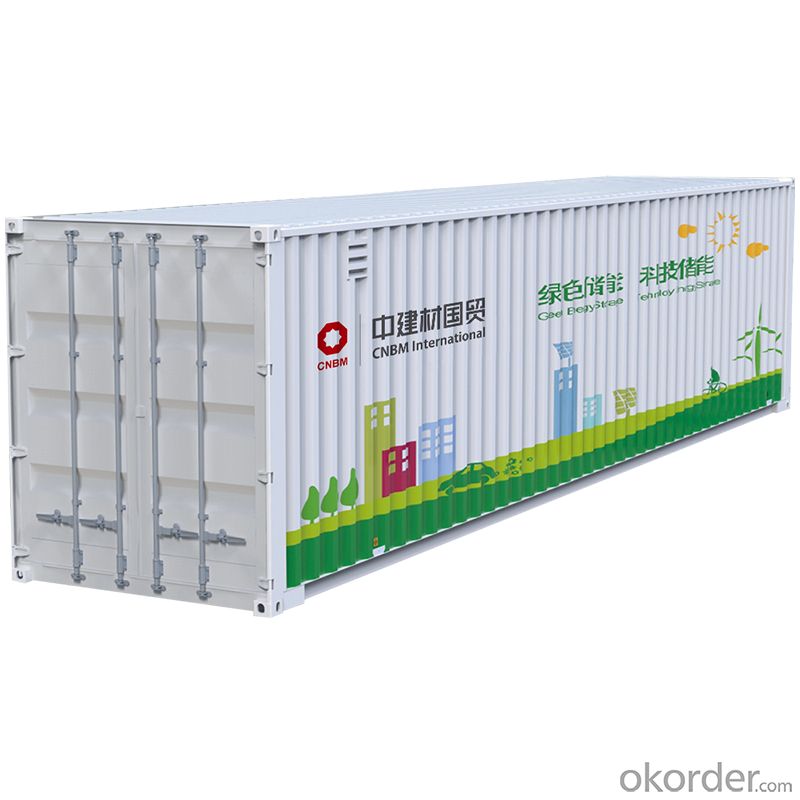
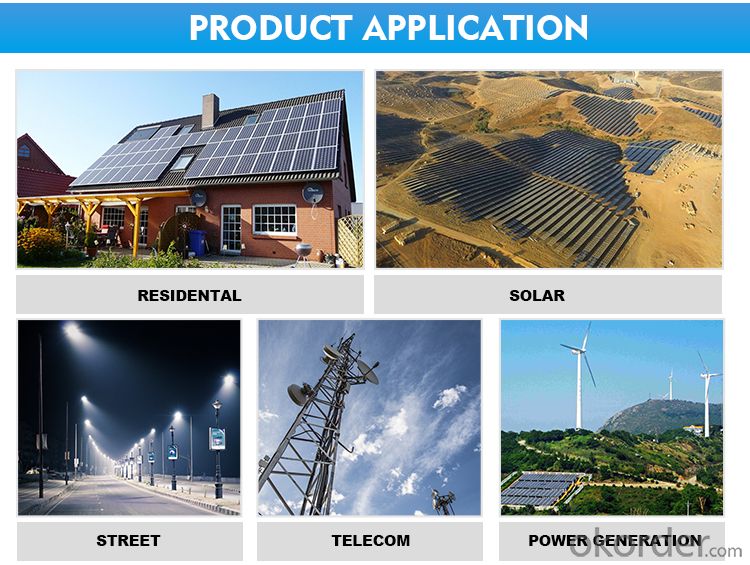
- Q: Can a solar energy system be installed on a roof?
- Yes, a solar energy system can be installed on a roof. In fact, rooftops are one of the most common locations for solar panel installations.
- Q: How do solar energy systems impact the reduction of fossil fuel consumption?
- Solar energy systems have a significant impact on the reduction of fossil fuel consumption as they provide a renewable and clean source of energy. By harnessing the power of the sun, these systems generate electricity without burning fossil fuels, thereby decreasing our reliance on non-renewable resources. Switching to solar energy helps decrease carbon emissions, mitigating climate change, and promoting a sustainable future.
- Q: Can solar energy systems be used for powering electric vehicle rental services?
- Certainly, electric vehicle rental services can utilize solar energy systems. The sun's rays can be harnessed by installing solar panels on the roofs of rental service facilities or parking lots, generating electricity. This generated electricity can then be used to charge the electric vehicle batteries, ensuring they are always available for rental. By incorporating solar energy, rental services can reduce their dependence on the grid and minimize their carbon footprint. Moreover, customers can benefit from convenient and environmentally-friendly charging options through the establishment of solar-powered charging stations at various locations. In conclusion, the integration of solar energy systems into electric vehicle rental services not only encourages the use of renewable energy but also enhances the sustainability and eco-friendliness of the transportation industry.
- Q: Can solar energy systems be used in powering sports stadiums?
- Yes, solar energy systems can definitely be used to power sports stadiums. In fact, many stadiums around the world have already started implementing solar energy systems to meet their energy needs. Solar panels can be installed on the rooftops, parking lots, or open spaces surrounding the stadium to capture sunlight and convert it into electricity. The main advantage of using solar energy in powering sports stadiums is its sustainability and cost-effectiveness. Solar energy is a renewable source of energy that does not emit any greenhouse gases during its operation, making it environmentally friendly and helping to reduce carbon footprint. Moreover, once the initial investment is made in installing the solar panels, the ongoing operational costs are relatively low, which can result in significant savings on the stadium's energy bills. The size and structure of sports stadiums make them ideal candidates for solar energy systems. The large surface areas of stadiums provide ample space for installing a significant number of solar panels, which can generate a substantial amount of electricity. Additionally, the open spaces surrounding the stadium allow for optimal sunlight exposure, ensuring maximum energy generation. Furthermore, solar energy systems can be integrated with other technologies to enhance their efficiency and functionality. For instance, battery storage systems can be employed to store excess energy generated during the day and use it during night events or during periods of low sunlight. This ensures a continuous and reliable power supply to the stadium, regardless of the weather conditions or time of day. In conclusion, solar energy systems can definitely be used in powering sports stadiums. They offer a sustainable and cost-effective solution to meet the energy needs of these large facilities, while also reducing their environmental impact. With further advancements in solar technology and decreasing costs, it is expected that more sports stadiums worldwide will embrace solar energy as a primary source of power in the future.
- Q: Can solar energy systems be used in rural areas?
- Yes, solar energy systems can definitely be used in rural areas. In fact, solar power is particularly well-suited for rural areas due to its decentralization and independence from the electrical grid. Rural areas often lack access to reliable and affordable electricity, making solar energy an attractive option. Solar panels can be installed on rooftops or on open land, providing a sustainable and renewable source of energy. Additionally, solar energy systems can be combined with energy storage solutions, such as batteries, to ensure a continuous power supply even during periods of low sunlight. This can be particularly beneficial for rural areas that may experience frequent power outages or have limited access to the electrical grid. Moreover, solar energy systems have a low maintenance requirement, making them suitable for remote locations where regular maintenance services may not be readily available. Overall, solar energy is a viable and increasingly popular solution for powering rural areas, offering numerous benefits such as reduced dependence on fossil fuels, cost savings, and environmental sustainability.
- Q: Can solar energy systems be installed on roofs?
- Yes, solar energy systems can be installed on roofs. In fact, rooftops are one of the most common locations for installing solar panels. The main advantage of installing solar panels on roofs is that they utilize the existing space without requiring any additional land. Rooftop solar installations are also advantageous because they are usually unobstructed by shading from trees or buildings, resulting in optimal sun exposure for generating electricity. Additionally, rooftop installations are often cost-effective as they can reduce the need for long-distance transmission lines and can directly supply power to the building they are installed on. Overall, installing solar energy systems on roofs is a practical and efficient way to harness clean and renewable energy.
- Q: How does the efficiency of solar panels vary across different installation locations?
- The efficiency of solar panels varies across different installation locations due to various factors such as the amount of sunlight received, the angle and orientation of the panels, shading, temperature, and local weather conditions.
- Q: Can solar energy systems be used for powering air conditioning systems?
- Solar energy systems have the capability to power air conditioning systems. Known as solar air conditioners, these systems make use of the sun's energy to operate the cooling process. They are usually comprised of solar panels that capture sunlight and transform it into electricity. This electricity is then utilized to run the air conditioning unit. By utilizing solar energy, these systems present a sustainable and eco-friendly option to traditional air conditioning systems, which rely on fossil fuels. Solar air conditioners are especially advantageous in regions with ample sunlight, as they can substantially decrease energy expenses and reliance on the electrical grid.
- Q: Can solar energy systems be used for powering telecommunications networks?
- Indeed, telecommunications networks can be powered using solar energy systems. Solar power is a renewable and sustainable energy source that can be utilized to generate electricity for various purposes, including powering telecommunication infrastructure. Solar energy systems comprise solar panels that convert sunlight into electricity through the photovoltaic (PV) effect. These PV panels are commonly installed on rooftops, ground-mounted arrays, or integrated into the structure of telecommunication towers. They absorb sunlight during the day and transform it into direct current (DC) electricity. To make use of this electricity for powering telecommunications networks, an inverter is employed to convert the DC electricity into alternating current (AC), which is the standard form of electricity used in most electronic devices. The AC electricity produced by solar panels can then be utilized to power telecommunication equipment, such as base stations, antennas, transmitters, and receivers. There are numerous benefits associated with using solar energy systems to power telecommunications networks. Firstly, solar energy is abundant and accessible in almost all geographical locations, making it a feasible choice for powering remote or off-grid telecommunication sites. This reduces dependence on traditional grid electricity, which may be unavailable or unreliable in certain areas. Secondly, solar power is environmentally friendly, emitting no greenhouse gases during operation. By utilizing solar energy, telecommunication networks can significantly decrease their carbon footprint and contribute to the global shift towards clean energy sources. Furthermore, solar energy systems require low maintenance and have a long lifespan, offering a dependable and cost-effective solution for powering telecommunication infrastructure. Once installed, solar panels necessitate minimal upkeep and can last for 25-30 years or even longer with proper care. In conclusion, solar energy systems can effectively power telecommunications networks. They provide a sustainable and dependable source of electricity, reduce environmental impact, and offer a cost-effective solution for remote or off-grid telecommunication sites. With the growing emphasis on renewable energy, solar power is becoming an increasingly popular option for powering various sectors, including telecommunications.
- Q: How does the temperature affect the performance of solar panels?
- The temperature has a direct impact on the performance of solar panels. Generally, higher temperatures can cause a decrease in the efficiency of solar panels. This is because as the temperature rises, the electrical conductivity of the materials used in the panels decreases, leading to a reduction in the conversion of sunlight into electricity. Additionally, higher temperatures can increase the resistance within the solar cells, resulting in a decrease in the overall power output. However, it is important to note that solar panels are designed to tolerate a wide range of temperatures and their performance can still be significant even in hot weather.
Send your message to us
Zen Solar Energy Systems - ESS Solar Energy Storage System 500kW 1MWh with LifePO4 Battery Container
- Loading Port:
- Shanghai
- Payment Terms:
- TT OR LC
- Min Order Qty:
- 1 unit
- Supply Capability:
- 10 unit/month
OKorder Service Pledge
OKorder Financial Service
Similar products
Hot products
Hot Searches
Related keywords
